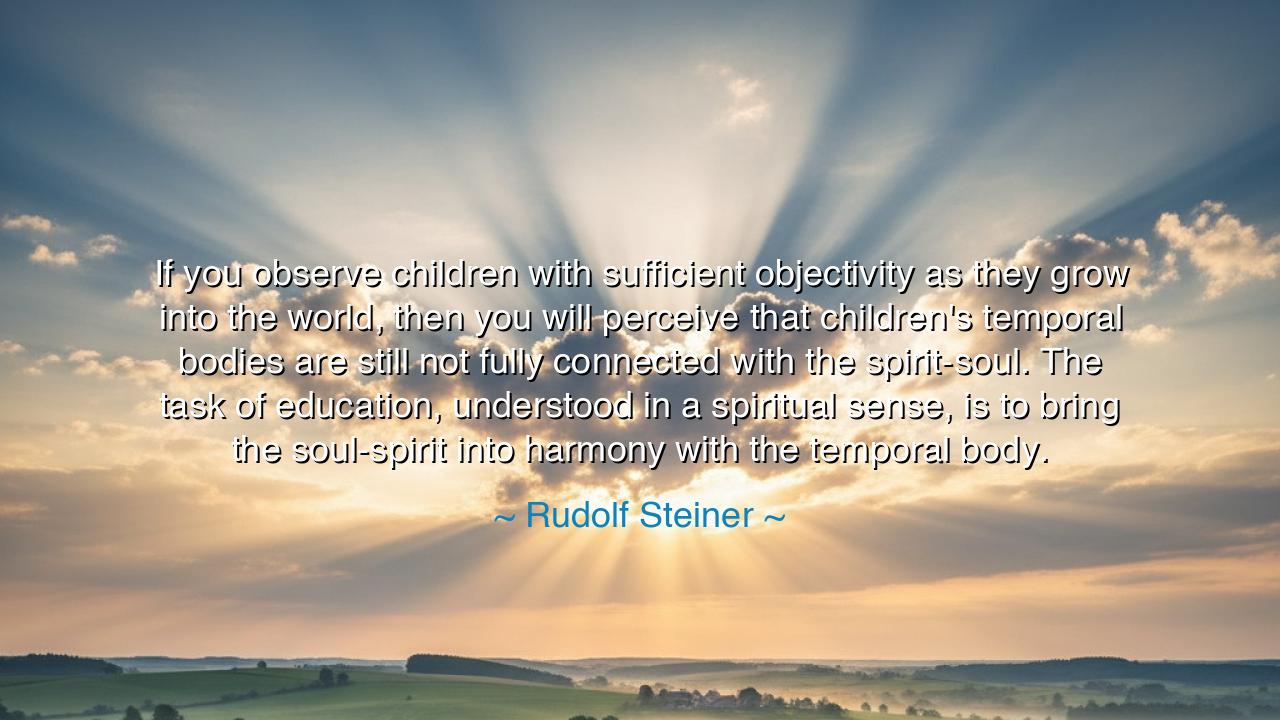
If you observe children with sufficient objectivity as they grow
If you observe children with sufficient objectivity as they grow into the world, then you will perceive that children's temporal bodies are still not fully connected with the spirit-soul. The task of education, understood in a spiritual sense, is to bring the soul-spirit into harmony with the temporal body.






“If you observe children with sufficient objectivity as they grow into the world, then you will perceive that children's temporal bodies are still not fully connected with the spirit-soul. The task of education, understood in a spiritual sense, is to bring the soul-spirit into harmony with the temporal body.” Thus spoke Rudolf Steiner, the Austrian philosopher, mystic, and founder of Waldorf education — a man who looked upon the child not as a vessel to be filled, but as a being unfolding between earth and heaven. In these words, he offers not a mere method of schooling, but a revelation of what education truly is: the sacred art of uniting body, soul, and spirit into one harmonious whole.
Steiner saw with the eyes of both the scientist and the seer. He understood that a child is not yet a finished being, but a divine seed still taking root in the soil of the world. The temporal body, the body of flesh and bone, grows from the earth — from nourishment, from heredity, from the material world. Yet within that fragile frame dwells something eternal: the spirit-soul, the essence of individuality, born of higher realms. The two — body and soul — do not at first walk in step. The young child lives in dreams, wonder, and imagination; they touch the stars even while their feet stumble on the ground. To educate, in Steiner’s vision, is not merely to instruct, but to guide this sacred union — to help the spirit descend gently into the world, so that what is divine in the child may find its rightful home in matter.
This is why Steiner called teaching a spiritual calling. He believed that every lesson, every rhythm of the classroom, must serve a higher purpose — to bring balance between the forces of heaven and earth that dwell within the child. The teacher, in this sense, becomes a kind of midwife for the soul, helping it awaken fully into the life of the body. When a teacher inspires not only thought, but feeling and will, then the child begins to shine from within — not merely as a student, but as a living harmony of inner and outer worlds.
In the ancient philosophies of the East and the West, this wisdom was already known. The Greeks spoke of paideia, the cultivation of the whole person — body, heart, and mind — so that one might live in harmony with the cosmos. The sages of India, too, taught that man is a tripartite being: body, mind, and spirit, woven together in the dance of existence. Steiner, standing at the dawn of the industrial age, saw how the modern world was losing sight of this unity. He warned that education, if reduced to the training of intellect alone, would breed cleverness without compassion, skill without wisdom — souls unanchored, spirits unfulfilled.
Consider the story of the first Waldorf School, founded in Germany in 1919, in the ashes of war. Its students were the children of factory workers, yet Steiner taught them painting, music, rhythm, and movement alongside reading and mathematics. For he knew that to heal a broken generation, one must teach not only the mind, but the whole being. Through art, they learned to feel; through thought, they learned to discern; through movement, they learned to will. The aim was not to produce workers or scholars, but complete human beings — grounded on earth, yet radiant with spirit. And in this union lay the seed of peace, for a soul in harmony with itself does not make war upon others.
The meaning of Steiner’s words, then, is both mystical and practical. He reminds us that every child carries within them a spark of the eternal, and that the role of education is to protect that flame while shaping it to live in the world. To force the intellect before the soul is ready is to burden the child’s spirit; to neglect the body is to leave the spirit homeless. True education, therefore, must be an act of balance — a weaving together of knowledge and wonder, structure and freedom, form and life.
So, my children, let this be your lesson: when you teach or guide the young, see beyond their behavior and beyond their words. Look instead for the light that struggles to take form within them. Nurture that light with patience, art, and love. Feed their minds with truth, their hands with skill, and their hearts with beauty. Do not rush the spirit to maturity, nor bind it with the weight of fear. For education, rightly understood, is not the making of scholars, but the awakening of souls.
In this way, Rudolf Steiner’s wisdom becomes not a philosophy of schooling, but a philosophy of life. For in every human being, even the grown, the task continues — to bring our spirit-soul into harmony with our earthly body, to live as bridges between the material and the divine. When this harmony is achieved, then life itself becomes an act of education — a continual becoming, luminous and whole, where the soul walks hand in hand with the world.






AAdministratorAdministrator
Welcome, honored guests. Please leave a comment, we will respond soon